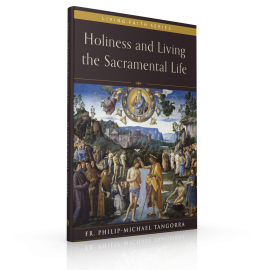By Philip-Michael Tangorra
Fr. Philip-Michael Tangorra is the author of Holiness and Living the Sacramental Life from Emmaus Road Publishing.

The sacred mysteries that we experience in the sacred liturgy, and to which we unite ourselves through an active interior participation in the sacraments, also unite us with the great act of love and salvation worked by Jesus, the Paschal mystery. As Gaudium et Spes states, “The Christian is certainly bound both by need and by duty to struggle with evil through many afflictions and to suffer death; but, as one who has been made a partner in the Paschal mystery, and as one who has been configured to the death of Christ, he will go forward, strengthened by hope, to the resurrection.”
Our participation in the sacred mysteries is central to our spiritual growth. As we take part sincerely and with devotion, we are purified from sin and the desire for sin, illuminated intellectually in order to gain greater understanding and love for the sacred mysteries of our salvation, and united in a communion of grace and love through the light of Christ.
The spiritual life of a Christian is centered on a more perfect union with the God who became man, so as to unite our human experiences to God’s divinity, that we might have life and have it more abundantly. The seven sacraments, Baptism, Confirmation, Eucharist, Penance, Marriage, Holy Orders, and the Anointing of the Sick (Extreme Unction) are meant to accompany us along our spiritual pilgrimage toward perfect communion with God. We receive the uniting effect of the sacraments with God through their capacity to offer us the fruits of the Paschal mystery which are the forgiveness of sins and a participation in the eternal life of Christ Jesus.
Each of the sacraments mediates to us the fruits of the Paschal mystery, but in the Eucharist we receive our participation in the Paschal mystery most perfectly. The entire life of the Church is directed toward communion with Christ, crucified and risen, which is experienced in the Eucharist, as Vatican II states: “From the liturgy, therefore, and especially from the Eucharist, grace is poured forth upon us as from a fountain, and the sanctification of men in Christ and the glorification of God to which all other activities of the Church are directed, as toward their end, are achieved with maximum effectiveness.”
The Eucharist provides us with him who is our salvation and redemption by granting us a share in his passion upon Golgotha. United by Christ to himself we become one with him and receive the fruits of his Resurrection; thus, he gives us a foretaste of the life to come. The sacramental body received in the Eucharist is the crucified, resurrected, and glorified body of Christ Jesus. Since the Eucharist is the body, blood, soul, and divinity of the Second Person of the Trinity, Jesus Christ, all the other sacraments find their completion and fulfillment in the Eucharist.
The Eucharist is the “sacrament of love.” Love precedes the other theological virtues, faith and hope, and we speak of love as the perfect and initiating power of faith and hope. Baptism/Chrismation (Confirmation) are the sacraments of faith (not that Holy Communion is not an act of faith, but it is in these sacraments, which ordinarily precede Holy Communion, that we receive the supernatural gift of faith). Our hope is renewed throughout our lives with the Sacrament of Penance and the Anointing of the Sick. And, faith and hope are consummated in love (see 1 Cor 13:13). Hence, all the sacraments receive their power from and are ordered unto the Eucharist: Jesus Christ.
You Might Also Like

Just outside the realm of visibility, the sacraments of the Church lie ready to effect real change in our lives. We need only to let them in. In Holiness and Living the Sacramental Life, Fr. Philip-Michael Tangorra lays out the mystical and invisible realities that are present during the celebration of the sacraments and explains how they can lead us to living ever more in tune with God.

